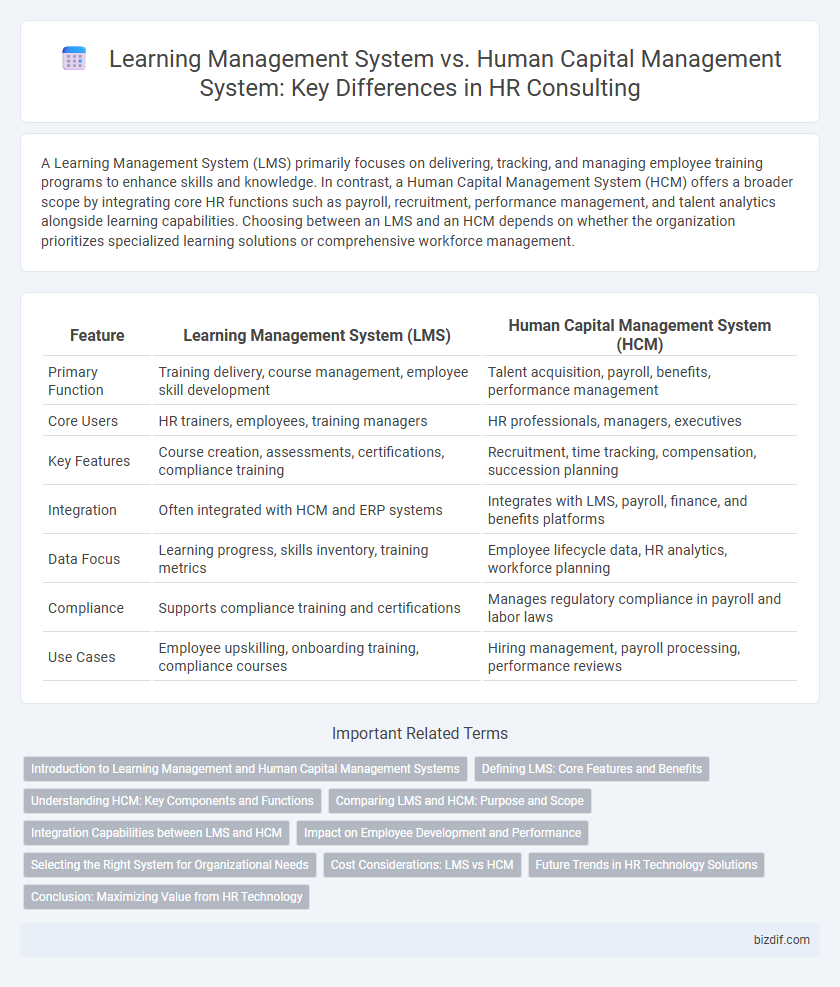A Learning Management System (LMS) primarily focuses on delivering, tracking, and managing employee training programs to enhance skills and knowledge. In contrast, a Human Capital Management System (HCM) offers a broader scope by integrating core HR functions such as payroll, recruitment, performance management, and talent analytics alongside learning capabilities. Choosing between an LMS and an HCM depends on whether the organization prioritizes specialized learning solutions or comprehensive workforce management.
Table of Comparison
| Feature | Learning Management System (LMS) | Human Capital Management System (HCM) |
|---|---|---|
| Primary Function | Training delivery, course management, employee skill development | Talent acquisition, payroll, benefits, performance management |
| Core Users | HR trainers, employees, training managers | HR professionals, managers, executives |
| Key Features | Course creation, assessments, certifications, compliance training | Recruitment, time tracking, compensation, succession planning |
| Integration | Often integrated with HCM and ERP systems | Integrates with LMS, payroll, finance, and benefits platforms |
| Data Focus | Learning progress, skills inventory, training metrics | Employee lifecycle data, HR analytics, workforce planning |
| Compliance | Supports compliance training and certifications | Manages regulatory compliance in payroll and labor laws |
| Use Cases | Employee upskilling, onboarding training, compliance courses | Hiring management, payroll processing, performance reviews |
Introduction to Learning Management and Human Capital Management Systems
Learning Management Systems (LMS) are specialized platforms designed to deliver, track, and manage employee training and professional development programs efficiently. Human Capital Management Systems (HCM) encompass a broader range of HR functions, integrating talent acquisition, performance management, payroll, and learning processes into a unified system. Understanding the distinct roles of LMS and HCM enables organizations to optimize workforce development and streamline human resource operations effectively.
Defining LMS: Core Features and Benefits
A Learning Management System (LMS) centralizes training delivery, tracking, and reporting for employee development within an organization. Core features of an LMS include course creation, progress monitoring, skill assessments, and certification management, promoting continuous learning and compliance adherence. Benefits encompass improved employee performance, streamlined training processes, and enhanced knowledge retention, making it essential for effective talent development strategies in HR consulting.
Understanding HCM: Key Components and Functions
Human Capital Management (HCM) systems encompass comprehensive features that go beyond Learning Management Systems (LMS) by integrating talent acquisition, performance management, payroll, and employee engagement capabilities into a unified platform. Key components of HCM include workforce planning, recruitment, onboarding, competency management, and succession planning, enabling organizations to strategically manage and optimize their human resources. Unlike LMS, which primarily focuses on training delivery and tracking, HCM systems facilitate end-to-end employee lifecycle management and data-driven decision making for enhanced organizational productivity.
Comparing LMS and HCM: Purpose and Scope
Learning Management Systems (LMS) primarily focus on delivering, tracking, and managing employee training and development programs, enhancing workforce skills and compliance. Human Capital Management (HCM) systems offer a broader scope by encompassing recruitment, payroll, performance management, and talent analytics alongside learning functionalities. Organizations seeking streamlined talent development versus comprehensive employee lifecycle management must evaluate their strategic HR priorities when choosing between LMS and HCM solutions.
Integration Capabilities between LMS and HCM
Learning Management Systems (LMS) and Human Capital Management (HCM) systems both enhance workforce development but differ in scope; LMS focuses on training delivery and skill development while HCM covers broader HR functions like payroll, recruitment, and performance management. Integration capabilities between LMS and HCM enable seamless data exchange, allowing HR professionals to synchronize employee learning records with talent management processes efficiently. This integration optimizes workforce planning by providing comprehensive insights into employee skills, career progression, and compliance tracking within a unified platform.
Impact on Employee Development and Performance
A Learning Management System (LMS) specifically enhances employee development by delivering targeted training and skill-building programs, fostering continuous learning and competency growth aligned with organizational goals. In contrast, a Human Capital Management (HCM) system integrates broader HR functions, including talent management, performance tracking, and workforce analytics, offering a holistic approach to optimizing employee performance and career progression. Both systems influence employee growth, but LMS drives specialized learning experiences while HCM supports comprehensive performance and talent strategies.
Selecting the Right System for Organizational Needs
Selecting the right system between a Learning Management System (LMS) and a Human Capital Management System (HCMS) depends on an organization's specific HR goals and operational needs. An LMS primarily supports employee training, development, and compliance tracking, while an HCMS offers comprehensive HR functions including talent management, payroll, and workforce analytics. Evaluating factors such as scalability, integration capabilities, user experience, and reporting features ensures alignment with organizational objectives and maximizes ROI in talent management strategies.
Cost Considerations: LMS vs HCM
Learning Management Systems (LMS) typically involve lower upfront costs and focus primarily on training delivery and tracking, making them cost-effective for organizations prioritizing employee development. Human Capital Management (HCM) systems encompass broader functionalities, including payroll, recruitment, and performance management, often resulting in higher implementation and maintenance expenses. Evaluating cost considerations between LMS and HCM requires analyzing the scalability, integration capabilities, and long-term ROI aligned with organizational HR strategies.
Future Trends in HR Technology Solutions
Learning Management Systems (LMS) are rapidly evolving to integrate AI-driven personalized learning paths and real-time skill analytics, enhancing employee development efficiency. Human Capital Management Systems (HCMS) are incorporating advanced predictive analytics and automation to streamline talent acquisition, workforce planning, and employee engagement. Future HR technology solutions will increasingly merge LMS and HCMS capabilities, creating unified platforms that support continuous learning, performance management, and strategic human capital optimization.
Conclusion: Maximizing Value from HR Technology
Choosing between a Learning Management System (LMS) and a Human Capital Management System (HCM) depends on an organization's specific HR goals and operational needs. Integrating LMS within a comprehensive HCM platform enhances talent development by streamlining learning with performance and payroll processes, thereby increasing overall HR efficiency. Maximizing value from HR technology requires aligning system capabilities with strategic workforce management to drive employee engagement and organizational growth.
Learning Management System vs Human Capital Management System Infographic

 bizdif.com
bizdif.com